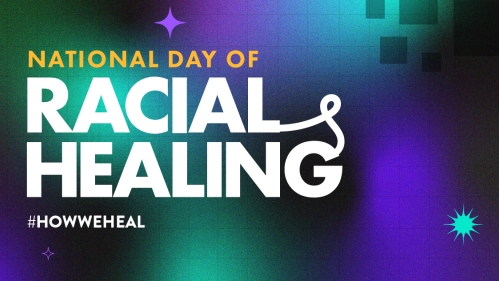The CEO and Executive Director of “The Who We Are Project” joined the Rutgers–Camden community for a discussion on the annual National Day of Racial Healing
In recognition of the National Day of Racial Healing, students, faculty, and staff from across Rutgers University–Camden engaged in an important and thought-provoking discussion on racism in America. The January 16 event, held in the university’s Campus Center and live-streamed via Zoom, featured lawyer and activist Jeffery Robinson and was hosted by Nyeema Watson, senior vice chancellor for strategy, diversity, and community engagement.
“There is so much of our history that no one has been taught or has even heard before, but it continues to impact who we are today,” said Robinson. “At least five provisions of our original Constitution directly protected the institution of slavery; I took Constitutional Law in law school, but no one ever taught me that.”
Robinson, a Harvard-educated lawyer, has over four decades of experience working on racial justice and equity issues. He is the CEO and founder of "The Who We Are Project," a nonprofit organization that exposes and promotes the historical truths of anti-Black racism in the United States while working to drive education, discourse, healing, and change.
The National Day of Racial Healing was created in 2017 as part of the W.K. Kellogg Foundation’s national Truth, Racial Healing & Transformation initiative, a comprehensive, community-driven effort to address the historic and lasting effects of racism and designed to bring about transformational and sustainable change. It occurs annually on the Tuesday following Martin Luther King Jr. Day.
Robinson spoke about the project, which has produced a film that chronicles racism in the U.S. The award-winning, feature-length documentary titled “Who We Are: A Chronicle of Racism in America” leverages personal stories, interviews, and historical documentation to examine how slavery led to pervasive and systematic discrimination, bias, bigotry, and violence towards Black Americans, which persists today.
From the early days of slavery to the days of Jim Crow, to the 1921 massacre in Greenwood, Oklahoma, to redlining and discriminatory housing policies in the 20th century and beyond, to the war on drugs instituted under the Nixon administration, the film draws a clear picture of how anti-Black racism has shaped and continues to shape American culture, limiting progress.
“My belief is, if you confront people with the facts, there’s no place else to go,” said Robinson during his conversation with Senior Vice Chancellor Watson. “That is the power of factual truth—it can change a person, it can change a community, and it can change a country.”
Robinson emphasized that the term “white privilege” does not mean a person has not worked hard or overcome obstacles, but rather that they move through the world differently than people of color and that the playing field is not level for all Americans.
"When it comes to racism in America, if you are not looking for it, it’s easy not to see it," Robinson said. "Many people know in their minds and their hearts they are not racist, and think there is nothing else for them to consider, but that alone is not enough to combat institutional racism." He emphasized that when you are in a position of power or privilege, you are obligated to recognize it and hopefully work to create a more just and equal society.
Robinson said he draws inspiration from the legacy of Reverend Martin Luther King, Jr., noting that his assassination left him feeling despondent even as a young boy, wondering who would carry on the work of Dr. King. Ultimately, he realized the responsibility for the work that still needs to be done to heal America lies within all its citizens.
"Dr. King exemplifies what can be accomplished with fortitude, intelligence, and love."
